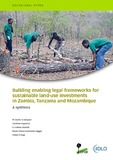Building enabling legal frameworks for sustainable land use investments in Zambia, Tanzania and Mozambique :A synthesis,

View/
Date
2015Author
Dalupan, M Cecilia G
Haywood, C
Wardell, DA
Cordonnier-Segger, MC
Kibugi, R
Language
enMetadata
Show full item recordAbstract
The International Development Law Organization
(IDLO) and the Center for International Forestry
Research (CIFOR) assessed the legal frameworks
for major resource sectors in Zambia, Tanzania
and Mozambique to analyze whether and to
what extent they enable sustainable investments.
Relevant international standards suggest that
sustainable investments integrate socioeconomic
and environmental concerns, bound together
by the rule of law. This calls for landscapes
governance, which considers all stakeholders,
interests and competing resource uses, under which
the traditional model of investment decisions based
solely on economic goals is broadened considerably
to place communities and environmental concerns
at the very heart of the process.
These countries’ national development plans
and their crosscutting laws on land and the
environment incorporate principles of sustainable
development. Their sector-specific laws governing
forestry, agriculture, mining and energy reflect
these principles to varying degrees. Relying
significantly on these sectors, these countries
have witnessed consistent GDP growth in
recent years. Despite their resource wealth and
increased investments, poverty and resource
degradation persist. Rural populations remain
disproportionately affected, with limited access to
basic services and increased vulnerability to the
impacts of deforestation and climate change.
Here we outline key insights on four common
issues identified by the legal assessments
that can hinder or enable sustainable landuse
investments. These consist of investment
incentives, security of customary land
tenure, enforcement of socioeconomic and
environmental safeguards, and public awareness
and participation. These issues also present
rule of law opportunities to support landscapes
governance aimed at empowering communities,
alleviating poverty and contributing to
sustainable development.
URI
http://www.cifor.org/library/5753/building-enabling-legal-frameworks-for-sustainable-land-use-investments-in-zambia-tanzania-and-mozambique-a-synthesis/http://hdl.handle.net/11295/92377
Citation
Dalupan, M. C. G., Haywood, C., Wardell, D. A., Cordonnier-Segger, M. C., & Kibugi, R. (2015). Building enabling legal frameworks for sustainable land-use investments in Zambia, Tanzania and Mozambique: A synthesis (No. CIFOR Occasional Paper no. 140). Center for International Forestry Research (CIFOR), Bogor, Indonesia.Publisher
University of Nairobi
